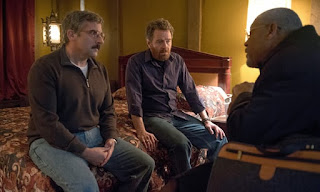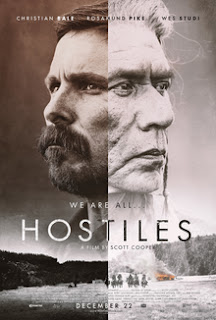"I'm Not Going To Bury A Marine. I'm Just Going To Bury My Son..."
Famous for works which tend to side on the edge of indie extraordinaire, Everybody Wants Some!! and Boyhood director, Richard Linklater, returns this week in a somewhat low-key fashion with Last Flag Flying, a noticeably comedic and undeniably likeable road movie which although may take a meaningful amount of time and effort to seek out, is just about worth it thanks primarily due to trio of leading performances which personify the meaning of flawless excellence. Utilising the acting chops of Steve Carell (The Big Short), Laurence Fishburne (John Wick: Chapter Two) and Bryan Cranston (Breaking Bad), Linklater's movie focuses on their long awaited rekindling after almost thirty years since their experiences as young Marines during the Vietnam war, and with Carell's Larry "Doc" Shephard leading the way for their reunion due to the untimely death of his son, what follows is a two hour journey through experiences both old and new, and one which focuses primarily on the effect of war and its' continuation through generation after generation.
Beginning in highly ambiguous fashion in regards to the overall direction of the narrative, the first thirty minutes of the movie introduces each of our leading characters in a latter period of their lives in which the memories behind them have somewhat influenced their modern day choices and latter day lifestyle, with Carell's Shephard a quietly reserved and delicate tragic figure of loss, contrasting Cranston's Sal, a raging alcoholic with a tendency to speak whatever is at the forefront of his mind, and Fishburne's Richard Mueller, a character seemingly acting as steady-handed counterpart to both, due to performance portraying a dedicated and contemplative man of faith who is forced into the duo's journey through his religious sensibilities, much to his own personal disdain. With the bulk of the movie focusing primarily on conversation, ranging from the finality of death to the political landscape of 21st century America, Linklater's movie works best when the emotional impact of the narrative really hits home, with Carell's performance arguably the standout thanks to moments of sincere and authentic heartbreak in which you truly feel the pain and suffering which sifts through his now isolated character. Whilst the movie does ultimately feel rather too drawn out and not entirely cinematic in comparison to Linklater's previous, similar endeavours, Last Flag Flying is worthy of admiration if not for a powerhouse of performances from actors renowned for not giving anything less.



























